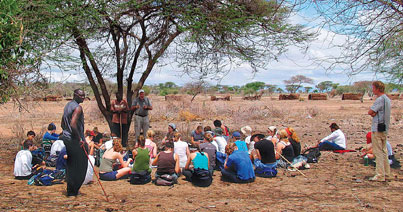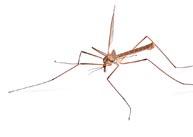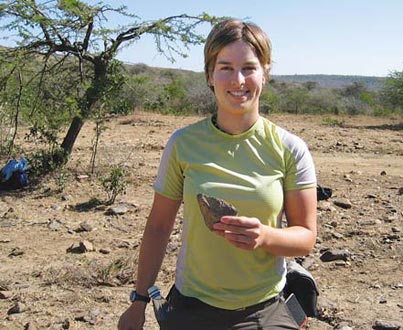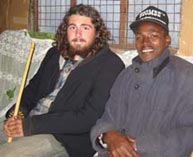A semester in Africa offers students the chance to do hands-on research and critically engage with real-world challenges.
By Mark Reynolds

At the edge of a watery pit, university undergrads watch a Kenyan entrepreneur dig for clay. The clay will be used to make bricks, but bricks aren’t the only thing the pit will produce: the standing water is an ideal breeding habitat for malaria-carrying mosquitoes. As the students draw in details—the water, the mosquitoes, the children playing nearby—they begin to make crucial connections.
From January to March, students travel in Kenya, Uganda and Tanzania as part of the annual Canadian Field Studies in Africa, a program designed to introduce them to current thinking on the interlinked nature of environmental and human problems. “Standing by the brick pits, we see the small end, the human end, of the funnel of Canada’s interest in foreign aid,” says McGill geography professor and CFSIA instructor Thomas Meredith. “We realize that the children are the ones made vulnerable to spreading malaria—the students ask if the children have or use bed nets. In classes on campus, we often consider why Canada seems so unable to reach even half of the 0.7 per cent GNP aid target that it has agreed to. On campus, it is an abstract discussion of policy and priorities. By the brick pit, we see the discussion with a human face.”
Meredith has been going to Africa with CFSIA students since 1998. “It’s an opportunity to teach in the field,” he says. “Even with all the improvements in classroom learning—from PowerPoint to webcasts—there is nothing like being in the field with students. We’re seeing things in their proper context, with all their links extrapolating out into the distance. In a classroom at home, we might learn that malaria takes 3,000 young lives per day in Africa. Here, we see villages struggling against environmental change, economic needs, failing policies—malaria is part of a complex picture of daily life.”
 Although McGill has been involved with the CFSIA for almost a decade, the University’s role changed radically in 2004 when British Columbia’s Langara College transferred the program to McGill; the CFSIA was seen as a way to complement McGill’s internationalization efforts, adding to the University’s existing field research programs in Panama and Barbados.
Although McGill has been involved with the CFSIA for almost a decade, the University’s role changed radically in 2004 when British Columbia’s Langara College transferred the program to McGill; the CFSIA was seen as a way to complement McGill’s internationalization efforts, adding to the University’s existing field research programs in Panama and Barbados.
Recent years have seen the CFSIA grow to become a model for honing the research skills of undergraduates. “The idea is that we’re training future researchers,” says Meredith. “It exposes students to real challenges, and to creative ways of thinking.” The CFSIA curriculum has students learn in six modules of social and biological sciences, grouped around themes like water conservation, biodiversity and urban development. In addition, students work with African-based scientists, government agencies and non-profit research institutes (including UN-HABITAT and the International Centre of Insect Physiology and Ecology, both based in Nairobi, Kenya). Working with these institutional partners, students design their own research projects; topics are shaped by the UN’s Millennium Development Goals, which include increasing access to education and reducing poverty and AIDS by 2015. The CFSIA students are “playing a part in a global agenda to meet these goals,” explains Meredith. “It elevates what might be seen as simply an academic exercise into something much more serious.”

For her research program last winter, Rachel Steed, a final-year international development studies student, studied access to health care in Kenya. She and her teammates interviewed a cross-section of Kenyans—in villages, in urban slums, in pastoral environments—to determine what Africans felt were the main barriers to accessing health care.
Many of the obstacles she discovered confirmed previous suspicions: poor infrastructure, too few doctors, high costs. But education proved to be a problem as well; some people won’t seek health care because they do not realize they have a medical problem, or they would prefer to turn to spiritual or traditional remedies.
“One of the main reasons was distance: it can take hours, sometimes, to reach a clinic,” says Steed. She found that prospective patients often bring along family members, meaning both individuals lose a day’s work: “That can affect the whole community.”
Steed is using the data she gained on the ground for her honours thesis on barriers to health care in Kenya. She says the face-to-face contact was irreplaceable: “Their views about existing problems are often very different from those in the books.”
While Steed took her African experiences home with her, other students have become so enthusiastic about their work that they’ve stayed beyond the three-month program. Alexandre Corriveau-Bourque first arrived as part of the CFSIA in January 2006 and plans to remain in Africa until March 2008. The international development studies graduate has devoted himself to organizing a series of grassroots projects, at the behest of chiefs Calvin Ariko and Justus Ochwedo from the Lake Victoria community of Gembe East, Kenya.
“The chiefs had seen well-meaning NGOs flock by the dozens to the island of Rusinga, dumping obscene amounts of funding, providing temporary employment, but fuelling corruption,” says Corriveau-Bourque. Compounding the problem was the fact the NGOs rarely provided feedback from knowledge they gained from their projects with the locals.
Ariko and Ochwedo asked Corriveau-Bourque and two other CFSIA students, Kathrin Gottwald and Katie Zulak, to gather data on incidence of disease, water and sanitation, infrastructure (schools, medical services, roads), food security and institutions able to coordinate development projects in the community. The students interviewed over 400 households and 100 local leaders to determine how the community perceived their conditions of life. During his final year at McGill, Corriveau-Bourque analyzed the resulting data and wrote a report which the community could use to prioritize the use of local resources. Immediately after he graduated from McGill, he returned to broaden this project, presenting his findings to the community and engaging in advocacy with local NGOs and government ministries. He began working with community leaders to help them identify and coordinate projects with locally available institutions and resources based on the report. Today, he is living in Nairobi, doing conflict research on an internship with the International Crisis Group, an NGO that uses field research and advocacy to prevent and resolve deadly conflicts. None of his activities, he says, would have been possible without the professors of the CFSIA.
“The professors not only considered us students, but also engaged us as colleagues and equals. They challenged us to critically analyze situations, and engage in discussions at a professional level.”

Alec Blair, currently pursuing a master’s in geography, is another old Africa hand. He signed up with the CFSIA in 2005, while on exchange to McGill from UBC. With an undergraduate degree in animal science, Blair was drawn to the conservation aspects of the field semester. He returned to Kenya in Spring 2007 to gather the data that has become the basis for his thesis on conservation conflicts.
Using the Laikipia district as a base, Blair studied human-wildlife conflict, and its impact on conservation management. Laikipia is home to hundreds of ranchers, co-existing, uneasily at times, with large populations of elephants, black rhinos and many other species. His goal was to interview locals about their wildlife conservation concerns, and learn what motivates their cooperation with efforts to protect the same animals that often threaten their livelihood and even their food sources.
In his first week of independent study in Africa after the field semester, Blair’s newly hired research assistant had returned to his home for a couple of days. “While he was there a hyena came to his home and killed one of his goats,” says Blair, adding that his assistant had to kill the hyena to protect the rest of his herd. “It was a real eye-opener for me—it really drove home how common these problems are.” Blair has found that local pastoralists are willing to participate in conservation efforts, if not for their own sake, then with the expectation that it will improve their lives. For ecotourism entrepreneurs, refraining from killing a troublesome elephant begins to make good business sense if visiting tourists are willing to pay to see the beasts.
Blair’s epiphany—and his desire to return to Africa—is typical, according to Professor Meredith, and a measure of the CFSIA’s success.
“It’s a germination process that has no ending,” he says, pointing out that the CFSIA students’ work directly supports the operations of their partner organizations, which, in turn, often invite the students to return. “There’s a real exhilaration with students when they stray from the classroom. They feel—correctly—that they are important actors in finding solutions for the global challenges they have studied at home.”
The CFSIA is administered and supported by McGill’s Faculty of Science, in partnership with the Faculty of Agricultural and Environmental Sciences and the Faculty of Arts, and with contributions from the Redpath Museum, the School of Dietetics and Human Nutrition and the Departments of Anthropology, Biology, Geography, History and Natural Resource Sciences. The University of British Columbia is an official CFSIA partner; Queen’s University faculty and students also participate. Funds for student research are available through the Ministère de l’éducation du Québec, and the International Centre of Insect Physiology and Ecology provides in-kind and institutional support.
Next: War Crime Stopper
